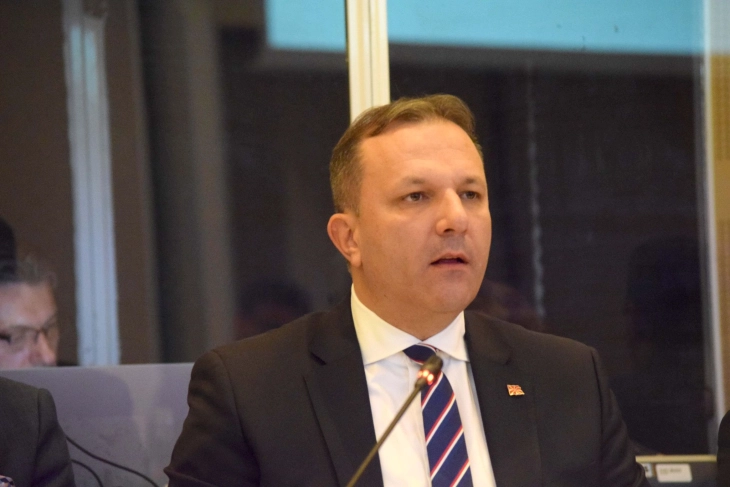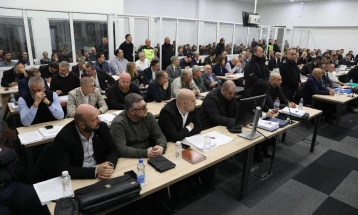Spasovski: Joint commitment in preventing illegal migration and migrant smuggling
- Minister of Interior Oliver Spasovski attended the 23rd meeting of the Police Cooperation Convention for Southeast Europe Committee of Ministers in Bucharest on Wednesday, chaired by Romania's Ministry of Interior, titled 'Preventing Migrant Smuggling and the Impact of the War in Ukraine on Police Cooperation.'
- Post By Nevenka Nikolik
- 12:30, 21 June, 2023

Skopje, 21 June 2023 (MIA) - Minister of Interior Oliver Spasovski attended the 23rd meeting of the Police Cooperation Convention for Southeast Europe Committee of Ministers in Bucharest on Wednesday, chaired by Romania's Ministry of Interior, titled 'Preventing Migrant Smuggling and the Impact of the War in Ukraine on Police Cooperation.'
Highlighting the current military and political and security crisis in the Near and Middle East, the war in Ukraine, the unfavorable economic and social situation in home countries as significant factors affecting the entry and transit of illegal immigrants across the country, Minister Spasovski said that the established Western Balkans route, which has favorable geographical configuration, allows for a quick and easy access from the Greek to the Macedonian-Serbian border, and other EU countries.
"Between January and March 2023, 3,518 illegal attempts to cross the border were prevented, most of them at the border with Greece, or 3,048, where attempts have decreased by 42 percent, and on the Serbian border attempts have decreased by 32 percent," Spasovski said, adding that the joint operation with the European Frontex Agency had begun two months prior which ensues a joint approach in dealing with the challenges of illegal activities along the border with Greece where Frontex has provided more than 100 officers, patrol vehicles, and special equipment.

As regards migrant smuggling, Minister Spasovski noted that those numbers have also decreased.
"When it comes to migrant smuggling, in 2023, 29 cases of smuggling 234 migrants were discovered, and criminal measures were taken against 21 people, with most migrants coming from Syria-144, Congo-39, Pakistan-17, and Afghanistan-16. Observations show that migrant smuggling and the number of migrants smuggled has decreased 17 percent," said Spasovski.
Pointing out that migrant smuggling is among the highest and most profitable forms of organized crime, after drug trafficking, Minister Spasovski said that in order to fight against migrant smuggling in a sustainable way, continuous efforts are needed which will give incentives to implement short and medium-term activities, adequate sources, and close cooperation of all countries along the route.
"It is more than clear that given the horizontal, cross-cutting nature of migrant smuggling and the high number of judicial and law enforcement authorities on a national, European, and international level, responsible for preventing smuggling activities, require specific results with interdepartmental coordination and cooperation, as well as exchange of information," noted Spasovski.
He pointed out that the Ministry of Interior has set up a National Commission for Combating Human Trafficking and Illegal Migration that operates under the direction of the Basic Public Prosecutor’s Office for Prosecuting Organized Crime and Corruption on the basis of a Memorandum for cooperation between the Ministry of Interior and the Public Prosecutor’s Office, as a good practice for cooperation between the institutions.
"Through this Commission, the Ministry is actively involved in the working group for the Western Balkans in which all countries of the Balkan peninsula participate, as well as some other European countries, and agencies such as Europol, Interpol and EASO, whose purpose is exchange of information and real-time intelligence related to migrant smuggling and human trafficking, database checks, joint investigations, organizing operational meetings, exchanging data on high-profile targets, sharing new modes on operation of organized crime groups, new routes, preparing monthly data on illegal immigration and other. Cooperation on this level is very important for the countries of the region and in the area of human trafficking, because there is a correlation between migrant smuggling and human trafficking, i.e. on their way to the end destination, illegal migrants can easily become victims of human trafficking," added Spasovski.
Given that the largest influx of migrants comes from Greece, Minister Spasovski believes it is necessary to intensify joint cooperation, including timely exchange of information, profiling organized crime groups and criminal collaborators, with the aim of establishing joint investigations for preventing migrant smuggling. He added that improving operational cooperation between all countries along the route would be very important, including Turkey, but also the EU countries that are the end destinations for migrants.
Regarding the impact of the situation in Ukraine on police cooperation, Spasovski said that the landscape of regional security has already changed, which will contribute to long-term consequences on international order.
"Some changes related to human trafficking, arms, drugs and illicit goods may be permanent, while others may be transitory, as power dynamics and laws change. This ever-changing nature, and the fact that these crimes cross national borders, can make it even more difficult for us to meet those challenges. Something that we can do, and what we are already doing besides the regular work, is a continuous analysis of the threats and risks that develop, training and capacity building for law enforcement authorities in the region and conducting campaigns to increase public awareness of the increased existence of risks and measures that can prevent it." said Minister Spasovski, adding that a common commitment to regional cooperation is key in dealing with common challenges. ssh/nn/
Photo: MoI







